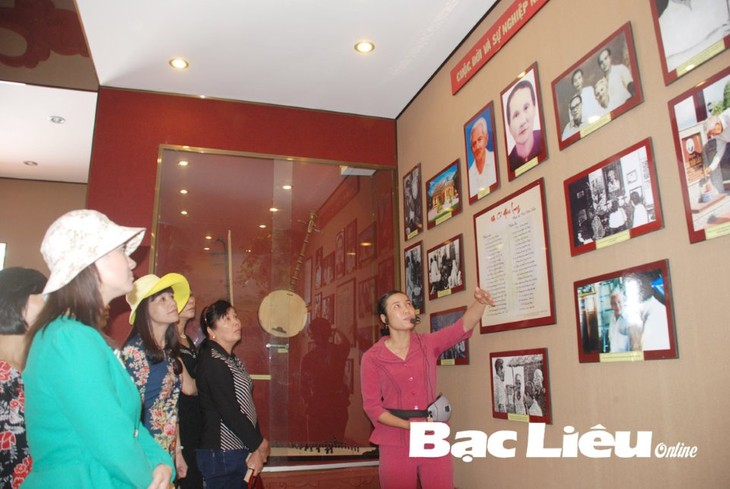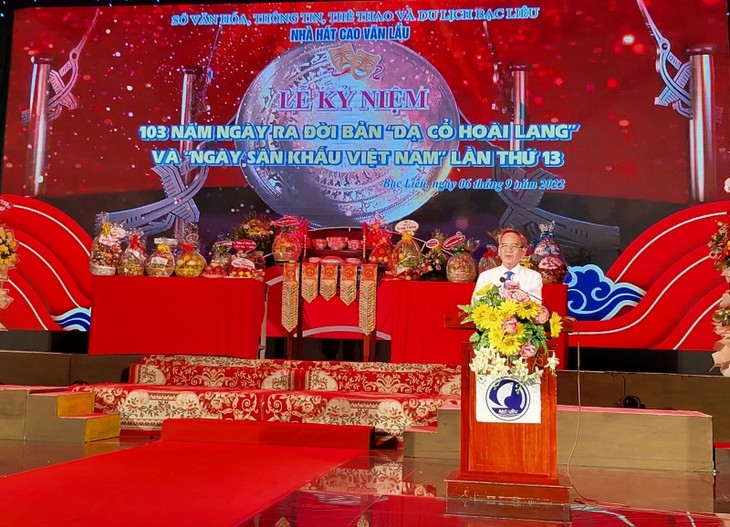(VOVWORLD) - Da Co Hoai Lang (Night Drumbeats for the Absent Husband) was composed by musician Cao Van Lau in 1919. It tells the love, anguish and pride of a young woman who awaits her husband’s return from the battlefield as she listens to the sound of war drums. Since then, Da Co Hoai Lang has been performed by generations of singers of Cai luong (Reformed Opera).
 Visitors at the memorial site dedicated to southern amateur music and composer Cao Van Lau in Bac Lieu province. (Photo: baobaclieu.vn) Visitors at the memorial site dedicated to southern amateur music and composer Cao Van Lau in Bac Lieu province. (Photo: baobaclieu.vn) |
Over the past 103 years, Da Co Hoai Lang has been considered the signature song on the Cai luong stage. Bac Lieu, the centre of Cai luong in the Mekong Delta, is the birth place of the well-known song.
In recent years, Bac Lieu provincial authorities have managed to preserve and promote the musical values of Da Co Hoai Lang through music clubs, training classes, and contests.
“After Da Co Hoai Lang was introduced, it immediately became popular. The song’s message was so close to life and won hearts of many listeners,” said Tran Thi Lan Phuong, Director of Bac Lieu province’s Department of Culture, Information, Sports, and Tourism.
Da Co Hoai Lang has helped make a name for generations of Cai luong artists. In Bac Lieu, a road and a theater are named after its author, musician Cao Van Lau. A memorial area dedicated to southern amateur music and Cao Van Lau was recognized as a National Cultural and Historical relic site and has been a popular tourist attraction in the Mekong Delta.
“Cao Van Lau is the star of folk music in the southern region. His Da Co Hoai Lang was not only popular at that time, but also serves as inspiration for many other versions,” said Tran Phuoc Thuan, a researcher of southern culture.
 Lu Van Hung, Secretary of Bac Lieu province’s Party Committee, speaks at a ceremony to mark Vietnam's Theatre Day and 103 years of Da Co Hoai Lang. (Photo: VOV) Lu Van Hung, Secretary of Bac Lieu province’s Party Committee, speaks at a ceremony to mark Vietnam's Theatre Day and 103 years of Da Co Hoai Lang. (Photo: VOV) |
At a recent ceremony to mark 103 years of Da Co Hoai Lang and Vietnam's Theatre Day, Lu Van Hung, Secretary of Bac Lieu province’s Party Committee, said the song reflects typical characteristics of people and land in the south and has become a signature tune on the Cai Luong stage.
“It is essential to preserve and promote tangible and intangible cultural values of different local ethnic groups for tourism development. We will make Bac Lieu an attractive destination with professional tourism services and friendly and hospitable people,” said Hung.